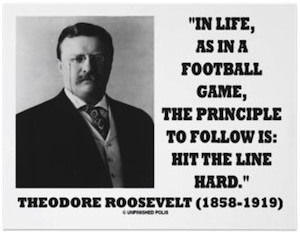LETTERS FROM THE GLOBAL PROVINCE
Shooting Oneself in the Foot, Hoof and Mouth Disease, and Other Dilemmas, Global Province Letter, December 29, 2010
If you could kick the person in the pants responsible for most of your trouble, you wouldn't sit for a month. -- Theodore Roosevelt
 ’Tis Us. We’re always quick to jump on unfortunate neighbors who drink too much, run up credit card debt, don’t wear their seatbelts, eat themselves into oblivion, and sink into the other pernicious addictions that imperil their lives and their happiness. But somehow we are too forgiving of the real enemy Walt Kelly uncovered for us. His comic strip Pogo pinned the tale on the donkey: “We Have Met The Enemy And He Is Us.” We’re loath to admit that we all inflict a whole lot of pain on ourselves.
’Tis Us. We’re always quick to jump on unfortunate neighbors who drink too much, run up credit card debt, don’t wear their seatbelts, eat themselves into oblivion, and sink into the other pernicious addictions that imperil their lives and their happiness. But somehow we are too forgiving of the real enemy Walt Kelly uncovered for us. His comic strip Pogo pinned the tale on the donkey: “We Have Met The Enemy And He Is Us.” We’re loath to admit that we all inflict a whole lot of pain on ourselves.
Bubbles and Other Snares and Delusions. Says Wikipedia: “Extraordinary Popular Delusions and the Madness of Crowds is a popular history of popular folly by Scottish journalist Charles Mackay, first published in 1841. The book chronicles its subjects in three parts: "National Delusions," "Peculiar Follies," and "Philosophical Delusions."
“The subjects of Mackay's debunking include economic bubbles, alchemy, crusades, witch-hunts, prophecies, fortune-telling, magnetisers (influence of imagination in curing disease), shape of hair and beard (influence of politics and religion on), murder through poisoning, haunted houses, popular follies of great cities, popular admiration of great thieves, duels, and relics. Present day writers on economics, such as Andrew Tobias and Michael Lewis, laud the three chapters on economic bubbles.[1]”
Importantly, we think that Mackay, and Lewis, and Tobias, and a host of others do not go far enough in their analyses of illusion, delusion, and grand illusion. We find that at every turn hordes of people are ready to march over a cliff as they chase after notions that are not just a little off course, but completely wrong-headed. The challenge then is to imagine what might forestall such herd behavior and keep society and its members from vaporizing themselves.
The Bag Lady. We cannot exagerate our society’s gullibility and capacity for getting it wrong. We would refer you to one Alexandra Penney who lost a goodly chunk of her life savings just when she thought she was riding on top of the world. For she had parked her dough with Bernard Madoff. She learned one night that he was a master swindler just when she was  completing a cheese soufflé. She and 4800 other investors (i.e., speculators) had lost $64.8 billion. She wrote about all this for Tina Brown on the Daily Beast, having fallen for this scam, along with a bunch of other smart people including MBAs, IBM executives, etc:
completing a cheese soufflé. She and 4800 other investors (i.e., speculators) had lost $64.8 billion. She wrote about all this for Tina Brown on the Daily Beast, having fallen for this scam, along with a bunch of other smart people including MBAs, IBM executives, etc:
I suddenly had a lot of money. I was in my late 40s, and I felt that I was just too old to have it in a plain old bank account. But I was a creative person, not a savvy investor, so I asked around and talked to my smartest friends with Harvard and Wharton MBAs. There appeared to be a secret society of Madoff investors. A friend who was older, wealthier, and more established somehow got me in. I've always had good luck, and I thought it was another stroke of good fortune to be invested with the legendary Bernard Madoff.
Every month I got detailed statements, and my money looked to be growing around 9 to 11 percent. It didn't seem greedy because I knew people other people who were making 15 or 20 percent. I thought, “This is just a very smart investor.”
Bad ideas, we see, are infectious, and they have no respect for the rich and smart and famous. Ms. Penney ostensibly talked to the best and brightest the Northeast had to offer, all of whom bought into Mr. Madoff. What we can also see is that there are plenty of Madoffs around who can lure people into self deceptions and bogus schemes that imperil their well being and that erode the compact of trust that allows societies to flourish. It seems that those who package bad ideas are much more adept at storytelling than those who spit out the truth. We must further ask ourselves why even the smartest of people are so obsessively dumb as to be taken in by the biggest frauds going.
High-Low Finance, Highways to Nowhere, Land Abuse. So we look the other way as manias envelop us and give currency to notions that have made a shambles of our economy for at least 40 years. Investment and commercial banks led us into our recent depression (and at least 50% of Americans know that it has been a full-fledged, heart-breaking depression). Despite some legal fix-its by Congress, they will do it again, because we have failed to bring the financial pirates under control. They continue to peddle bad products that are intrinsically defective and insufficiently secured. Wall Street’s leaders of high finance have sped down the low road since the Kennedy Years, palming off so-called structured financial products and other houses of cards that they themselves were shorting (betting against) in their own asset management operations. There is not a major house in the Street whose skirts are clean: the biggest bankers were the worst offenders. Dreadful derivatives are peddled right and left, at this very moment. This will lead to another bust.
Huge sums flow into road building and air transport. Yet the roads on the ground and the highways in the air suffer from ever increasing gridlock. Washington, D.C. itself, after LA, has the second worst traffic jams in the country, our lawmakers blind to the congestion right at their doors. Against much opposition, the Obama Administration has pushed through funding for high-speed trains, which are a much better way to move people along inter-urban corridors. Little noticed, Spain has developed the best network of trains in Europe, and it continues to spend on them even though its public finances are in a bloody mess. It’s time to make tracks, not roads, nor airports. But we pretend that autos and planes are still viable.
Oozing Land Development. Long ago we learned that LA does not work. It is the scene of vast traffic jams, cheap developments, unrelenting pollution, and more. And yet we are creating more LA’s around the country. That’s the story of the heart of the New South—Atlanta. Other parts of the South and Southwest are oozing sideways—in dribs and drabs—dotting the landscape with blotches of this and that. The well-intentioned would prefer to build in clusters—often with high structures—preserving green spaces in between, but they have not made much headway against the unholy alliance of banks, developers, and lawyers who feast on the decimation of our landscape. In state after state, this has set the stage for traffic jams, pollution, flooding (since all vegetation is thoughtlessly mowed down in the process), and other forms of civic malaise.
In other words, we manage to ignore the big problems, taken in by the high priests of commerce. At our peril. How might we come to dissect the crazy schemes that are eating our lunch? How do we as a society stop shooting ourselves in the foot? How do we find our way? We have enumerated this handful of self-defeating behaviors (there are many more) the nation ardently pursues, not to darken your New Year, but to speculate with you on how we can get on a sounder footing.
For sure we must put aside depression and despair, the self-defeating diseases that produce anger but little action. Angst simply does not do very much for us. Our task is to think big and make big things happen.
Sports Injuries. Our big insistent problems have such a stubborn hold on us both because they make some folks a whole lot of money but also because they have a psychotic attraction for our citizenry. Sports are an awfully good example. The broadcast media gorge on sports and citizens obsess about their teams, even if sport itself has ceased to be sportsmanlike.
In this atmosphere, sports injuries have grown apace in schools, in colleges, and in the professional leagues. Yet a host of small often unnoticed individuals and groups have made some headway against the insanity. Little, almost unseen, initiatives gradually are canceling the blank check we have given to the sports community. So sports injuries and sports beautifully illustrate the cancer-like stubbornness of our problems and the ways, nonetheless, we can conquer the unconquerable.
For instance, a onetime coach and now retired UNC professor Fred Mueller has been gathering data on sports injuries for years. Without too much fanfare, he’s been publishing the straight facts about concussions, paralysis, broken legs, and deaths from all around the country in annual reports—effective documents because they focus on data, not argument, and even make clear where we have made progress. Football, to nobody’s amazement, still produces horrible injuries. A surprise, for us, is that cheerleading is a very bad culprit: the participants try dangerous stunts that belong in the circus, not on a playing field.
Football inflicts wounds that keep on wounding. Dr. Robert Cantu, in Boston, is even studying the brains of deceased football players and finds them to be riddled with tattoos etched on them from lifetimes of abuse. In fact, in many sports, the focus of injury research has now moved from visible breaks and knocks suffered while at play to long-term, hidden, severe injuries that abide without healing in an athlete’s system.
 Oddly, it was America’s great 20th century president—Teddy Roosevelt—an advocate of the rugged, outdoor sporting life—who, in the early 1900s, hammered heads together in order to rid football of some of its worst excesses. Often government can best change our ways, not by legislation, but by pushing leaders in many institutions to achieve a worthwhile consensus.
Oddly, it was America’s great 20th century president—Teddy Roosevelt—an advocate of the rugged, outdoor sporting life—who, in the early 1900s, hammered heads together in order to rid football of some of its worst excesses. Often government can best change our ways, not by legislation, but by pushing leaders in many institutions to achieve a worthwhile consensus.
Nonetheless, bits of legislation are also helping to bring common sense to the athletic field. We would point, for instance, to the Zackery Lystedt Law in the state of Washington, which mandates close physical examinations before a player with a concussive injury can return to the playing field.
It’s lots of little things, not one big movement, that has altered some of the worst behaviors on our playing fields.
Sportsmanship. And yet, as in so many of our endeavors, rules and regulations are not enough. It’s not enough to mandate helmets, or to bar diving into low-level pools, or to change the nature of the course in women’s cross-country. We cannot just tinker with the rules, if sport itself, as now practiced, is intrinsically unhealthy. That is, as several coaches have put it to us, the urge to win often has overwhelmed decency and common sense. Coaches don’t rotate all their players in and out of a game, because this might blight their records: bodies overplayed easily fray. Professional sports are often dominated by the teams that, year in and year out, can afford the biggest payrolls. College teams, in full gear, begin their practices in late summer in 100-degree temperatures, so that deaths and heat strokes are a foregone conclusion. Poor school districts around the country spend more on their playing fields and gyms than they do on their classrooms. The fun of the game is devoured by unruly, demonizing ambition and licentious competitiveness.
The Greek philosopher Aristotle advised us against inflicting too much sport on adolescents. In Politics, he cautions: “Gymnastic is the first stage of education, but we must not develop the valor and physique of our children at the expense of the mind, as they do in Sparta. Until puberty, and for three years after, bodily exercise should be light.” Whether we are talking about football, or competitive running, or archery, sports have gotten out of hand. Played as they are, they are helping make the nation dumb. We are hurting our bodies---and our minds.
Camp Dudley. We find it more than appealing to learn of Camp Dudley, which is about sportsmanship as much as anything. Several jolly fellows we know summered there. One or two fine athletes coached there. Camp Dudley’s motto, “The Other Fellow First,” was adopted in the early 20th century. Dudley is and was a summer camp for boys (now complemented by a camp for girls across the lake) where a bit of spirituality and a lot of sportsmanship are the order of the day. We like especially one old tale about the camp sent to us by a devoted alumnus:
This took place at the Cub Baseball Diamond a couple of years ago during Parents' Weekend. The kids are 10- and -one- half. Coaches are 18. A hotshot pitcher mows down 6 Cubbies in the first two innings. The rules call for rotating another pitcher in after 2. Our hotshot heads to center field, happily. At just this point his dad rolls in 1/2 hour late for the game in a late model BMW LI Sedan, parking in a no- parking area right behind the backstop. He emerges and confronts the coach as to why his son isn't pitching. The coach explains the two- inning rule. The father rants at the coach...he's grooming his son for the big leagues, and demands that the kid be returned to the pitcher's mound.
Then enters 100-year-old Bill Vanneman Sr. #3560 who started Dudley in the early 1920s. Bill stands up from the bench where he's sitting with the Cubs, walks with cane in hand over to the ruckus, looks at the Dad and says "I don't know who you are, or where you're from but sit down and shut up!" The father does.
At the end of the season, the Camp Director gets a letter from the father saying that he had learned a thing or two that summer about Dudley and competition.
There's hope, one dad at a time.”
And this is what it takes to have sport, instead of a reckless brawl of gladiators that hearkens back to the Roman Coliseum. There is no sport without sportsmanship. And society does not function very well unless we have both sport and sportsmanship.
There’s a role for the Bill Vannemans of the world even when they get to be 100. They should be honored, since many elders understand that civility is a devil of a lot better than errant individuality. Perhaps our senior citizens whom we have put on the shelf have lived long enough to help the rest of us avoid self-destructive behavior. Maybe our old-timers can temper our excesses.
P.S. One must thoroughly understand how pernicious the financial community is for America. It’s not just that it has sold us a pig in a poke. But too many people and too many dollars flow through the portals of finance, diverting resources that should go into the productive economy. Wall Street itself is an unhealthy diversion which keeps us from minding the real store. We are fond of recounting that the most honorable Federal Reserve Chairman of the 20th Century—Paul Volcker—doesn’t think much of all the so-called innovation that has come out of the Street. About the only innovation, he thinks, that has done us much good in the last 50 years is the ATM: the rest is hogwash.
P.P.S. The movie above all that comprehends our propensity to chase snares and delusions is Jean Renoir’s Grand Illusion which examines how war and other glorified propensities separate men from economic security, the beautiful life, and, above all, their quintessential humanity.
P.P.P.S. Men know lacrosse can be a dangerous sport, so they wear helmets. Women don’t and they often pay the price. See “Helmet Safety in Women’s Lacrosse.”
P.P.P.P.S. Cheating in school has now become so pervasive that businesses have been founded to contain it. “Cheats Find An Adversary in Technology,” New York Times, December 20, 2010, pp.A1 & A3. “Business has been good for Caveon, a company that uses ‘data forensics’ to catch cheats, billing itself as the only independent test security outfit in the country. Dr. John Fremer, a co-founder, once worked at the Educational Testing Service but now helps state education commissioners and others uncover widespread cheating on the tests he once helped construct. Its computers, out in American Fork, Utah, use algorithms to look for obvious copying amongst students or to look for odd patterns—such as test takers who get tough questions right but who strike out on easy questions. There is some question as to whether these tests actually do help us highlight bright, hardworking students despite the current test mania in the nation. But they do tell us how early the urge builds to win at any cost. It’s hard for a nation to think straight when it is too busy thinking crooked.
Home - About This Site - Contact Us
Copyright 2010 GlobalProvince.com